Viewing Blog: La Bloga, Most Recent at Top
Results 1 - 25 of 2,429

Chicana Chicano Literature, Chicana Chicano Writers, Chicana Chicano Fiction, Children's Literature, News, Views, Reviews
Statistics for La Bloga
Number of Readers that added this blog to their MyJacketFlap: 11
Blog: La Bloga (Login to Add to MyJacketFlap)
JacketFlap tags: Chicanonautica, chicano sci-fi, #DiversityInSFF, Chicano spec lit, Add a tag
Blog: La Bloga (Login to Add to MyJacketFlap)
JacketFlap tags: author, interview, video, Michele Serros, Add a tag
In this video interview Michele Serros chats story, skateboarding and ethnic politics with llan Stavans.
Blog: La Bloga (Login to Add to MyJacketFlap)
JacketFlap tags: poetry, poems, Floricanto Movement, chicanarte, spanish literature, eulogy, chicano photography, Add a tag
My intent was to hook the preponderantly raza employees on reading, so I stocked lunchrooms with sci-fi, detective novels, a classic or two, and Michele Serros' Chicana Falsa. The most disappeared title was Michele Serros' Chicana Falsa.
One day while walking through an office I heard loud guffaws and poked my head in. One of the executives had picked up Chicana Falsa and couldn't put it down. He was reading instead of working. Michele's chicharrón story had him in tears. Better still, the vato had been one of the company's English-only crowd, and the book softened his heart. Orale, Michele.
Michele Serros had that effect on everyone whom she touched with her rapier wit, cultural insight, and elegant prose. Ave atque vale, Michele.
Que en paz descanses.
In lieu of flowers/gifts, Michele humbly requests you please contribute to her Give Forward campaign. Donations can be made online or sent via mail to:
Michele Serros
c/o Flacos
3031 Adeline St.
Berkeley, CA 94703
Art and Floricanto at Rock Rose
Michael Sedano
The phone caller told me she was looking at new-to-her lyrics to Quirino Mendoza y Cortés' Cielito Lindo and had I heard these? Vibiana Aparicio-Chamberlin planned to sing the song, along with Las Mañanitas, at the artists' reception for Images of La Virgen de Guadalupe through the eyes of Aparicio de Guatemala, Vibiana Aparicio-Chamberlin, Pola Lopez, Julie Soto, and Antonio Rael at Highland Park's Rock Rose Gallery.
Coincidence? That is my grandmother's and mother's favorite song. I'd been playing Cielito Lindo daily during the holidays, remembering my gramma and my mom. Vibiana invited me to be the accompanist on Rock Rose's baby grand.
I arrived tempranito so Vibi and I could rehearse. Gallerist Rosamaria Marquez had the piano in tune. We sounded good, though we needed a bit of work. As with many highly popular songs, gente tend to alter the tempo and shift the tied notes to different measures from the score. "De la sie..rra" becomes "De la sierra..." A lifetime of singing it that way is tough to unlearn.
Few experiences match a pianist's joy at hearing voices singing along with one's fingers. Cielito Lindo is a waltz, so I emphasized the 1-2-3 bass and endeavored to keep the melody consistent with the singers' habitual styling. The singing was totally beautiful and together we found our rhythm. Everyone knew the words and the entire audience joined in with broad smiles and sentimental warmth. We did three choruses and I know my gramma and mom enjoyed it. For me, it was puro magic.
Chamberlin--one of the veteranas from the 1973 Festival de Flor y Canto, emceed with excellent improvisation. We skipped Las Mañanitas, a good thing because my plan to segue into Happy Birthday to You depended on my fingers remembering a chord change I invariably mess up.
Vibiana Aparicio-Chamberlin reads and performs "La Llorona." Aparicio-Chamberlin opened her reading honoring her mother Isabel Luna Aparicio (b. 1917).
Luna De Leche
by Vibiana Aparicio-Chamberlin
Dedicated to my mother, Isabel Carrasco Luna Aparicio
Sacrificial scent of a bursting moon.
Violet and taut are the veins
on your forehead.
Abundant and clear is the liquid
released down your thighs.
From you,
I am expelled
in spasms of heat and ice,
a bruised slippery body.
I am alone.
Torn from your velvet womb.
My desperate mouth,
my tongue, my throat cry out.
Searching for you.
Mamá. Madre.
Luna de leche.
You give me comfort,
you give me courage.
Your gift is your milk.
Warm healing honey.
Each breast, a promise of a
brown wooden bowl of flour,
shortening, un poquito de agua
and a pinch of salt,
for an endless meal
of warm round tortillas.
Mamá.
Mi luz.
Source of endless leche,
de su ser
Persimmons
Your blood
Mi sangre
Cada gota
Cada pulso
Suckle.
Sup.
Pleasure sweeps between us.
Sleep.
Stomach satiated.
Soul sanctified.
Miriam Quesada follows with a Spanish language piece as sculptor Aparicio de Guatemala looks on.
Abel Salas, publisher of Boyle Heights' community newspaper, Brooklyn & Boyle, shares a reading from his telephone screen.
John Martinez stepped out of his comfort zone and read his work in Spanish translation. His is a beautiful effort to expand the role of language in poetry for monolingual Chicanos like him. Ajua! John--Juan--for a magnificent strategy.
Poets with sculptor Aparicio de Guatemala stand in front of Aparicio's Guadalupe sculpture, one of two. The second, a standing piece not pictured, he fashioned from red heart wood, acquired locally from a tree-trimmer.
Hispabooks seeks deeper penetration into the United States' Spanish-Literature-in-Translation movimiento. Editorial Director Gregorio Doval writes, "Ya distribuimos desde hace más de un año a través de Ingram / Lightning Source (en librerías y online, paperback & ebook). Pero el próximo 1 de junio de 2015, nos comenzará a distribuir "on a larger scale" Consortium. Desde entonces nuestros libros estarán ya en todas las librerías que los deseen."
If you're Spanish-challenged, or faltando el Castellano, but enjoy excellent writing from an Iberian imagination, you'll be pleased learning Hispabooks has been distributed in the US by Ingram / Lightning Source. In June, distribution steps up to una escala más grande via Consortium.
From Hispabooks' Facebook About:
"Hispabooks is a publishing house focusing on contemporary Spanish fiction in English-language translation, both in eBook and trade paperback format, targeting readers around the world who want to explore the best of today’s Spanish literature."
Already released titles include:
"THE FAINT-HEARTED BOLSHEVIK", by Lorenzo Silva
"NOTHING EVER HAPPENS", by José Ovejero
"THE HAPPY CITY", by Elvira Navarro
"UPPSALA WOODS", by Álvaro Colomer
"THE HOTEL LIFE", by Javier Montes
"THE BIRTHDAY BUYER", by Adolfo García Ortega
"THE STEIN REPORT", by José Carlos Llop
"ANTÓN MALLICK WANTS TO BE HAPPY", by Nicolás Casariego
"PARIS", by Marcos Giralt Torrente
"RAIN OVER MADRID", by Andrés Barba
"A MAN ON HIS WORD", by Imma Monsó
"WOMAN IN DARKNESS", by Luisgé Martín
"THE HISTORY OF SILENCE", by Pedro Zarraluki
Forthcoming titles:
"THE PLIMSOL LINE", by Juan Gracia Armendáriz
"UNPAID DEBTS", by Antonio Jiménez Barca
"THE SAME CITY" by Luisgé Martín
"LA MALA MUERTE", by Fernando Royuela
"OJOS QUE NO VEN", by José Ángel González Sainz
"VENÍAN A BUSCARLO A ÉL", by Berta Vías Mahou
"LA HORA VIOLETA", by Sergio del Molino
"LA MALA LUZ", by Carlos Castán
"PADRES, HIJOS Y PRIMATES", by Jon Bilbao
"LANDEN", by Laia Fàbregas
"INTENTO DE ESCAPADA", by Miguel Ángel Hernández
On-line Floricanto: First in 2015
Kai Coggin, upfromsumdirt, Mario Angel Escobar, Odilia Galván Rodríguez, Xico González
La Bloga On-line Floricanto is a monthly feature at La Bloga-Tuesday. On-line Floricanto, now in its fifth year, features poetry nominated by the Moderators of the Facebook group Poets Responding to SB1070: Poetry of Resistance. Founded by Francisco X. Alarcón as a poet's response to the hate legislation spewed by Arizona's legislators in 2010, Poets Responding to SB1070 is a living resource for contemporary poetry from a diverse community of like-minded gente.
A second On-line Floricanto in January will feature the Best Poems of 2014.
February's On-line Floricanto celebrates St. Valentine's / Love and Friendship Day. Visit Poetry of Resistance on Facebook for guidelines on submitting for February.
“⌘ Planting An Acorn After A Massacre” by Kai Coggin
“An Open Letter To My Daddy Anem” by upfromsumdirt
"I can't breathe"by Mario Angel Escobar
“We Can't Breathe” by Odilia Galván Rodríguez
"Free Birds" by Xico González
⌘ Planting An Acorn After A Massacre
by Kai Coggin
When I heard the news
of the 132 school children massacred,
the taliban suicide bombers in
explosive-lined vests
blowing up the lights of brightened futures,
emptying thousands
of shell casings into the heads of innocents,
I went outside with my grief,
couldn’t hold it indoors,
I walked in circles
and wondered
how the sun
could continue this charade,
how the breeze could decorate
the almost barren trees
with dancing dried skirts,
quivering leaves.
I held the hands of the sky
and whispered unknown names
into the afternoon silence,
as two turkey vultures
cut the blue by
flying infinities overhead.
I walked.
Each step accompanied
by the sound of dried leaves
crunching underfoot,
and fallen acorns shone slick
in the light of the sun,
some dusted with grains of sand
that reflected prismatically
into the tiniest rainbows,
almost invisible.
I picked one up.
It had cracked open,
its red root arm reaching out for earth,
seed sprout seeing possibility,
the process of growth
inherent in its nature.
Without question and without fail
scores of acorns around me
had split open
in these cold months,
split open and started the process of
digging themselves down into the dirt,
the brilliant design that unlocks
wooden hinges and breaks free.
I thought of the children,
their arms reaching toward futures
that they could not see
but could feel,
their brilliant design,
their chubby reddened cheeks,
their laughter,
their learning becoming
scattered schoolbooks
and bomb-blasted classrooms,
they will not become trees,
they will not get past the point
of just barely breaking through,
red blood arms shielding faces
that wonder how this could be the end,
then it is,
was,
blackness,
ending.
The innocents should not die
for a God that does not live by the moral code
that innocents should not die.
I get lost in all this,
the soft breeze,
the blood,
the peaceful valley of my home,
the massacre that touches the same earth floor
dirt on which I stand and gather bursting-open acorns,
juxtaposition of death and life,
my red root fingers dig for the meaning,
for the karmic and cosmic balance,
and all I can do is find a patch of softened moist soil,
a spot that gets good sunlight,
and I shovel a small hole with a jagged flat rock
and lay the
acorn
inside
the hole
with the red root
pointing toward the planet’s core.
“Something small must have a chance,”
I say to myself,
and I cover the acorn with the supple
ground.
I encircle the life burial plot
with a mandala of 11 acorn caps,
(you know the little hats that acorns wear)
I make a circle,
because circles are unbroken,
because life should be unbroken,
because something small must have a chance.
I close my eyes,
and let the sun kiss me
until I am warmed inside
with the red of late afternoon,
until I see the mightiest oak tree in my mind,
132 sprawling green limbs
reaching up, up, up,
for
Heaven.
An Open Letter To My Daddy Anem
(a non-poem)
by upfromsumdirt
maaaan, i really wish yall'da made
a world for yall then and not one for us today, because
all of our tomorrows are borrowed.
i really wish yall'da fought for land
(mississippi, georgia, florida, 'bama)
places to farm and fort and export...
placing Black America on an actual map,
an african american Writ Of Existence.
maaaaan, with a land your own
yall coulda built a car company,
"university" universities
without the need for culturally
enabling signifiers. coulda built
museums and rockets
and slums as low-end shelter
and not slums as black-face-hiders.
yall coulda built a wall
to stall the racists. a gall divider.
green parks and industrial dumps
all ours... maaaaan, but naawww...
oppression turnt us into pacifists
and dream-merchants with new
access to pension plans... but
no places for us to go in a pinch
when those with the most rights
are unruly.
point blank:
i wanna die a surprise
and not die the price
for equality
insufficiently funded.
maaaan, i recognize yall did yall's best
teaching us to trust a system
not built to embrace us. but
that was wrong.
and i dont want my own son
singing this samosong
in his letters to me.
I can't breathe
by Mario Angel Escobar
In memory of Eric Garner
Officer, officer,
My family is waiting for me.
Please listen to me.
I can't breathe!
Officer, officer,
I don't want to be another anonymous death
in the holocaust of indifference.
I can't breathe!
Officer, officer,
Don't let me fall on the sidewalk.
Dirty pavement where I've been since the days of slave patrol.
Ancestral language
stripped naked
in chains.
I can't breathe!
Officer, officer,
people will missed me at the dinner table.
I am lifeworthy.
Please listen to me.
I can't breathe!
Officer, officer,
The soul bleeds.
Please don't let darkness open its jaw.
Earthquake in my lungs.
I can't breathe!
Officer, officer,
Don't deny me of that precious oxygen.
This drum still beats strong.
I can't breathe!
Officer, officer,
don't dismiss my plight.
Don't erase my name.
You and I travel together
in this floating asteroid.
Please let me be.
I can't breathe!
Officer, officer,
Every time you see me,
you try to mess with me.
Please listen to me!
I can't breathe!
We Can't Breathe
(no justice, no peace)
by Odilia Galván Rodríguez
we witness
that without justice
there can be no peace
without justice
there can be no peace
no justice no peace
when we must raise our children
to be murdered at anytime
on these mean streets
by those whom we pay to protect us --
there is no justice
no justice no
PEACE
Free Birds
by Xico González C/S
Black birds
And
Brown birds
And
White birds
And
Yellow birds
And
Red birds
And
Multi colored birds
And
Rainbow colored birds
Fly together in rhythm
Yearning to be free
Pajaritos y pajaritas
Preparan nidos
Para protegerse de los elementos
Y de los golpes duros de la vida
Little birds
prepare nests
to protect themselves from the elements
and the hard knocks of life
Perseverancia
hace fuertes las plumas débiles
de nuestras alas y de nuestras almas
Volar es nuestro destino
Duro es el camino
pero se tiene que atravesar
Perseverance
transforms feathers of wings and souls
from weak to strong
Flying is our destiny
The trail is rough,
but it must be crossed
Pájaros de todos colores
No reconocen fronteras
Se mueven de aquí pa’allá y de allá pa’ aca
Birds of all colors
Do not recognize celestial borders
and move freely in the immense sky
Pájaros de todos colores
Piden libertad, respeto,
Igualdad y justicia social
Birds of all colors
Demand freedom, respect,
social justice, and equality.
Black birds
And
Brown birds
And
White birds
And
Yellow birds
And
Red birds
And
Multi colored birds
And
Rainbow colored birds
Fly together in rhythm
United and free.
• Meet the Poets •
Kai Coggin, upfromsumdirt, Mario Angel Escobar, Odilia Galván Rodríguez, Xico González
Kai Coggin is a full-time poet and author born in Bangkok, Thailand, raised in Southwest Houston, and currently a blip in the three million acre Ouachita National Forest in Hot Springs, AR. She holds a Bachelor of Arts in Poetry and Creative Writing from Texas A&M University. She writes poems of feminism, love, spirituality, injustice, metaphysics, and beauty. Kai has been published in Elephant Journal, Cliterature, The Manila Envelope, [empath], Catching Calliope and an anthology released summer 2014 called Journey of the Heart.
She released her first chapbook, In Other Words, in August 2013. Her first full-length book of poetry PERISCOPE HEART was published by Swimming with Elephants Publications in September 2014. She is also a Teaching Artist with the Arkansas Arts Council, specializing in bringing poetry and creative writing to classrooms around the state.
Kai knows that words hold the potential to create monumental and global change, and she uses her words like a sword of Beauty. She can be found most Wednesdays at Maxine’s, reading her poems into an open mic, hoping the wind carries her words out to the world. Find more about her at her website.
Eshu help him!
Mario A. Escobar (January 19, 1978-) is a US-Salvadoran writer and poet born in 1978. Although he considers himself first and foremost a poet, he is known as the founder and editor of Izote Press. Escobar is a faculty member in the Department of Foreign Languages at LA Mission College. Some of Escobar’s works include Al correr de la horas (Editorial Patria Perdida, 1999) Gritos Interiores (Cuzcatlan Press, 2005), La Nueva Tendencia (Cuzcatlan Press, 2005), Paciente 1980 (Orbis Press, 2012). His bilingual poetry appears in Theatre Under My Skin: Contemporary Salvadoran Poetry by Kalina Press.
Odilia Galván Rodríguez, eco-poet, writer, editor, and activist, is the author of four volumes of poetry, her latest, Red Earth Calling: ~cantos for the 21st Century~. She’s worked as an editor for Matrix Women's News Magazine, Community Mural's Magazine, and most recently at Tricontinental Magazine in Havana, Cuba. She facilitates creative writing workshops nationally and is a moderator of Poets Responding to SB 1070, and Love and Prayers for Fukushima, both Facebook pages dedicated to bringing attention to social justice issues that affect the lives and wellbeing of many people. Her poetry has appeared in numerous anthologies, and literary journals on and offline.
Xico González is an educator, artist, poet, and a political and cultural activista based in Sacramento, California. He received a MA in Spanish from Sacramento State, and a MFA in Art Studio from the University of California at Davis. González currently teaches Spanish and Art Studio at the Met Sacramento High School.
The work of Xico González seeks to empower people uniting in common cause against a common oppressor disguised in different máscaras. Gonzalez’s silkscreen posters address and support numerous political causes, such as the struggle for immigrants’ rights, the Palestinian and Zapatista struggles, and the right for Chicana/o self determination. González is not only an artist, but is also an activist/organizer that puts his artistic skills to the benefit of his community. Xico’s work contributes to the long dialogue of art, activism and the legacy of the Chicano Art Movement. González has been influenced primarily by his mentors, Chicano artists Ricardo Favela (RIP), and Malaquías Montoya, and by early Chicano art collectives like the Mexican American Liberation Art Front (MALA-F), and the Rebel Chicano Art Front also known as the Royal Chicano Air Force (RCAF).
Blog: La Bloga (Login to Add to MyJacketFlap)
JacketFlap tags: Add a tag
 |
| Tony Diaz (Photo Credit: Divinci) |
TONY DIAZ: This is a major case of truth being stranger than fiction. And it will take several semesters of Mexican-American studies courses to fully appreciate, comprehend, and document all the nuances, cultural subtexts, historical facts, and fiction against our fiction. We are a blessed generation that can fill that San Francisco courtroom to witness a young Chicana making history and fighting for every American's freedom of speech.
Apparently Democracy has to re-boot every 40 or 50 years. This time the work as fallen on the broad shoulders and broader imaginations of Chican@s.
TD: Arizona passed a law to prohibit Mexican-American Studies. The sense that makes is non-sense. So I have to take the legislators at their word. They believe that 6-year-old to 17-year-old Mexican Americans reading books by Sandra Cisneros, Dagoberto Gilb, Carmen Tafolla, Rudolfo Anaya somehow promotes the overthrow of the government.
The folks who profess that are simply trying to sabotage the American Dream.
The books that some Arizona officials fear inspired me to not just finish college, but to get a Master's Degree, to become a professor. My parents were migrant workers. Because of education, my family has gone from the farm fields to where I now have the privilege of representing my culture on national platforms—in just one generation.
Officials who want to prohibit Ethnic Studies do not want to see our young flourish.
We hope to help raise $3,000. We invite everyone to pitch-in to help cover the travel costs to get Maya Arce and Korina Lopez to San Francisco to testify. You can donate directly to travel costs by clicking here: MAS Trial.
Put Tejas Foco or Librotraficante in the note, just for us to keep track of the pledge goal.
If you are in San Francisco, help swarm the court room, Monday, January 12, 8:00 a.m. to 5 p.m. at:
95 7TH STREET,
SAN FRANCISCO, CA 94103
There is also an Ethnic Studies Solidarity Event: Summit and Teach-In on Saturday, January 10, 2015 at Mission High School in San Francisco, CA.
Blog: La Bloga (Login to Add to MyJacketFlap)
JacketFlap tags: Add a tag
 |
| La Santa Cecilia with their Grammy (Grammy Awards, January 2014) |

 |
| "Cascada de Flores" conjunto |
 |
| "La Santa Cecilia" |
Blog: La Bloga (Login to Add to MyJacketFlap)
JacketFlap tags: diversity, memories, growing up, San Antonio, life lessons, Chicano Author, Anglos, Thomas Jefferson High, Add a tag
 |
| A highway like this "improved" my 1st neighborhood |
 |
| San Anto was the military's playground |
 |
| Projects like where we lived |
 |
| Marie B's were shorter than this |
 |
| like the coach who "taught" me |
 |
| Real pic of my high school |
 |
| Everybody knew your grades |
 |
| I could write a book: How Chess Can Pay for Your Lunch |
 |
| Berkeley radicalism my best friend's parents saved him from |
 |
| last time I returned to San Anto, for my novel |
Blog: La Bloga (Login to Add to MyJacketFlap)
JacketFlap tags: Los Angeles, Amtrak, Santa Barbara, Union Station, Add a tag
 |
| The Santa Barbara Amtrak Depot |
 |
| Santa Barbara |
| All Aboard! |
 |
| Union Station, the Los Angeles Amtrak Depot |
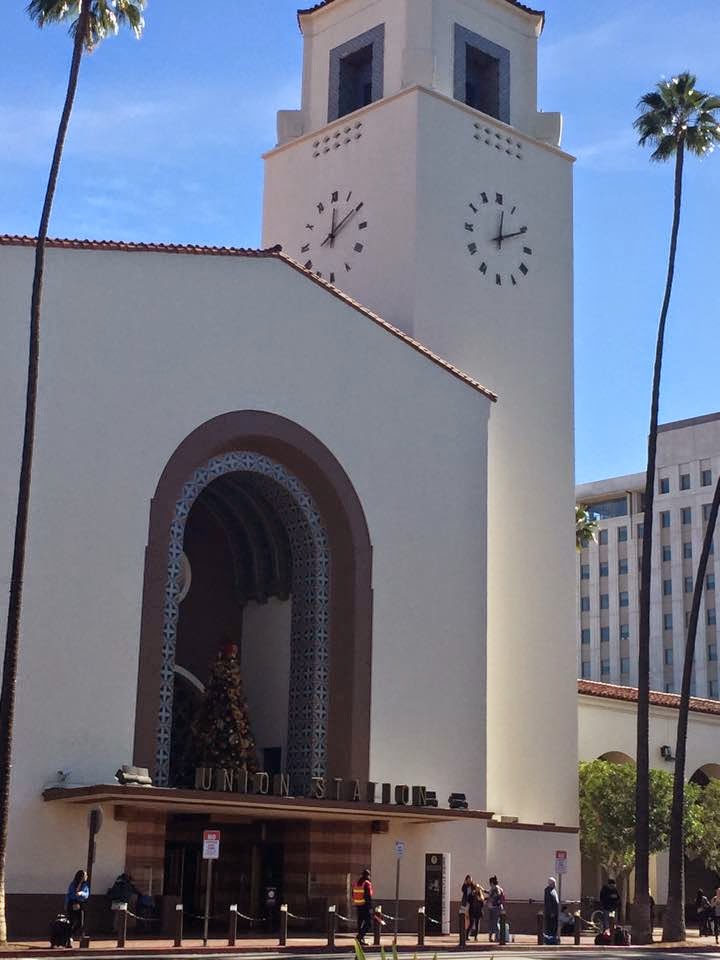 |
| You can go anywhere in the country from Union Station. |
 |
| Downtown L.A. |
 |
| Inside Union Station |
 |
| Michael Sedano |
 |
| Join us for a dinner and floricanto in honor of Michele Serros |
Blog: La Bloga (Login to Add to MyJacketFlap)
JacketFlap tags: Add a tag
Blogueros share their
NEW YEAR'S RESOLUTIONS
Attend to HEALTH and RECOVERY.
FIGURE OUT what happened on The Other Side by writing it down.
USE GoPro camera to video The Gluten-free Chicano's RECIPES,
CELEBRATE turning seventy on my 47th wedding anniversary."
"I resolve to write the BEST damn book I can in 2015."
Melinda's
"No more broken bones or broken body parts or broken spirit. Adios 2014! I resolve to undue all the damage done by my broken leg. I will walk with confidence and grace and, now and then, I will break into a strut and dance down the street. Sure, I want to lose weight and clean house more often, but writing and reading will come first. I wish everyone a kind and loving 2015. Cheers!
FEEL FREE TO ADD YOUR OWN RESOLUTIONS...
2015
Blog: La Bloga (Login to Add to MyJacketFlap)
JacketFlap tags: New Year, poem, El brindis del bohemio, Add a tag
Guillermo Aguirre Fierro (Mexicano)
El Paso, Texas 1915
En torno de una mesa de cantina,
una noche de invierno,
regocijadamente departían
seis alegres bohemios.
Los ecos de sus risas escapaban
y de aquel barrio quieto
iban a interrumpir el imponente
y profundo silencio.
El humo de olorosos cigarillos
en espirales se elevaba al cielo,
simbolizando al resolverse en nada,
la vida de los sueños.
Pero en todos los labios había risas,
inspiración en todos los cerebros,
y, repartidas en la mesa, copas
pletóricas de ron, whisky o ajenjo.
Era curioso ver aquel conjunto,
aquel grupo bohemio,
del que brotaba la palabra chusca,
la que vierte veneno,
lo mismo que, melosa y delicada,
la música de un verso.
A cada nueva libación, las penas
hallábanse más lejos
del grupo, y nueva inspiración llegaba
a todos los cerebros,
con el idilio roto que venía
en alas del recuerdo.
Olvidaba decir que aquella noche,
aquel grupo bohemio
celebraba entre risas, libaciones,
chascarrillos y versos,
la agonía de un año que amarguras
dejó en todos los pechos,
y la llegada, consecuencia lógica,
del "feliz año nuevo".
Una voz varonil dijo de pronto:
- las doce, compañeros;
digamos el "requiescat" por el año
que ha pasado a formar entre los muertos.
¡Brindemos por el año que comienza!
porque nos traiga ensueños;
porque no sea su equipaje un cúmulo
de amargos desconsuelos.
- Brindo, dijo otra voz, por la esperanza
que la vida nos lanza,
de vencer los rigores del destino,
por la esperanza, nuestra dulce amiga,
que las penas mitiga
y convierte en vergel nuestro camino.
Brindo porque ya hubiere a mi existencia
puesto fin con violencia
esgrimiendo en mi frente mi venganza;
si en mi cielo de tul limpio y divino
no alumbrara mi sino
una pálida estrella: Mi esperanza.
¡Bravo!, dijeron todos, inspirado
esta noche has estado
y hablaste bueno, breve y substancioso.
El turno es de Raúl; alce su copa
y brinde por . . . Europa,
ya que su extranjerismo es delicioso.
Bebo y brindo, clamó el interpelado;
brindo por mi pasado,
que fue de luz, de amor y de alegría,
y en el que hubo mujeres seductoras
y frentes soñadoras
que se juntaron con la frente mía.
Brindo por el ayer que en la amargura
que hoy cubre de negrura
mi corazón, esparce sus consuelos
trayendo hasta mi mente las dulzuras
de goces, de ternuras,
de dichas, de deliquios, de desvelos.
-Yo brindo, dijo Juan, porque en mi mente
brote un torrente
de inspiración divina y seductora,
porque vibre en las cuerdas de mi lira
el verso que suspira,
que sonríe, que canta y que enamora.
Brindo porque mis versos cual saetas
lleguen hasta las grietas
formadas de metal y de granito,
del corazón de la mujer ingrata
que a desdenes me mata.
¡pero que tiene un cuerpo muy bonito!
Porque a su corazón llegue mi canto,
porque enjuguen mi llanto
sus manos que me causan embelesos;
porque con creces mi pasión me pague.
¡vamos!, porque me embriague
con el divino néctar de sus besos.
Siguió la tempestad de frases vanas,
de aquellas tan humanas
que hallan en todas partes acomodo,
y en cada frase de entusiasmo ardiente,
hubo ovación creciente,
y libaciones, y reir, y todo.
Se brindó por la patria, por las flores,
por los castos amores
que hacen un valladar de una ventana,
y por esas pasiones voluptuosas
que el fango del placer llena de rosas
y hacen de la mujer la cortesana.
Sólo faltaba un brindis, el de Arturo,
el del bohemio puro,
de noble corazón y gran cabeza;
aquel que sin ambages declaraba
que sólo ambicionaba
robarle inspiración a la tristeza.
Por todos lados estrechado, alzó la copa
frente a la alegre tropa
desbordante de risa y de contento
los inundó en la luz de una mirada,
sacudió su melena alborotada
y dijo así, con inspirado acento:
-Brindo por la mujer, mas no por esa
en la que halláis consuelo en la tristeza,
rescoldo del placer ¡desventurados!
no por esa que os brinda sus hechizos
cuando besáis sus rizos
artificiosamente perfumados.
Yo no brindo por ella, compañeros,
siento por esta vez no complaceros.
Brindo por la mujer, pero por una,
por la que me brindó sus embelesos
y me envolvió en sus besos;
por la mujer que me arrulló en la cuna.
Por la mujer que me enseñó de niño
lo que vale el cariño
exquisito, profundo y verdadero;
por la mujer que me arrulló en sus brazos
y que me dió en pedazos
uno por uno, el corazón entero.
¡Por mi madre! bohemios, por la anciana
que piensa en el mañana
como en algo muy dulce y muy deseado,
porque sueña tal vez que mi destino
me señala el camino
por el que volveré pronto a su lado.
Por la anciana adorada y bendecida,
por la que con su sangre me dió vida,
y ternura y cariño;
por la que fue la luz del alma mía;
y lloró de alegría
sintiendo mi cabeza en su corpiño.
Por esa brindo yo, dejad que llore,
que en lágrimas desflore
esta pena letal que me asesina;
dejad que brinde por mi madre ausente,
por la que llora y siente
que mi ausencia es un fuego que calcina.
Por la anciana infeliz que sufre y llora
y que del cielo implora
que vuelva yo muy pronto a estar con ella;
por mi madre bohemios, que es dulzura
vertida en mi amargura
y en esta noche de mi vida, estrella.
El bohemio calló; ningún acento
profanó el sentimiento
nacido del dolor y la ternura,
y pareció que sobre aquel ambiente
flotaba inmensamente
un poema de amor y de amargura.
Blog: La Bloga (Login to Add to MyJacketFlap)
JacketFlap tags: travel, contests, guest writer, Best of the year, Add a tag
Guest Columnist Raúl Sánchez: Poet's TedX Talk
Raúl Sánchez was surprised to learn that the Yakima County Dream Team was using poems from his poetry collection, All Our Brown-skinned Angels, at immigration rallies and assemblies. He did not realize that had launched a thirst for his, and related work, in the local communities. He was invited to present at TEDx Yakima Salon on October 24.
 Here is Raúl’s account of the presentation at the Yakima Valley Museum.
Here is Raúl’s account of the presentation at the Yakima Valley Museum.
The process of preparation began by watching the videos already available from other local conferences and cities in order to get the idea of the flow, intent, punctuation and impact to be delivered to the listener.
The theme for the event was “Growth”. The organizers picked that name based on one of the poems in my book titled “Dandelion”. They told me that the metaphor of the fuzzes like words flying in the breeze and landing in the ear of those who listen thereby growing and developing into a new idea, a new poem to heal, moved and inspired others.
I started by describing the genesis of the original idea. On a walk with my daughter, she picked the biggest dandelions and blew the fuzzes with her breath ,watching them fly in the breeze. I immediately thought: What if those fuzzes were the words in a poem and what impact would those words have on people far away from me?
All of us have experienced these feelings when we read poems other poets have published. That was precisely the experience some of the folks in the Yakima Valley experienced when they read or heard the poems at those Dream Team assemblies. I was honored to learn of their response, that my work had an effect on people I’ve never met.
I organized my talk about the experience of creating a poem and how the idea shapes up into a compact story by “using the best words in the best order.”
My presentation highlighted words from W.B. Yates, Philip Larkin and Martín Espada. I was careful to use images the audience would find easy to see in their minds’ eye. I enhanced the pieces using rhythmic alliteration, metaphor and mystery.
I made a point of exactness and slowing down to see what is always there but which remains unappreciated because we are always in a hurry to appreciate other people or the nature around us. That had a tremendous effect as part of the message in the presentation as well as the tenderness expressed when my daughter and I write poems together.
The TedX talk experience brings satisfaction from knowing that my work is appreciated somewhere else, even though I may not have first hand knowledge of the effects of my work. It was a significant honor, being on that stage. It magnified and encouraged me to write poems that seek to inspire and move others, like “Dandelion,” one of my favorite poems in All Our Brown-Skinned Angels.
Dandelion
by Raúl Sánchez
My daughter and I wrote a poem last night
We picked ideas and objects to write about
We mixed them up
in a salad bowl
carefully tossed
We picked funny words
to make happy sounds
We added, repeated, deleted
We laughed and fell to our toes
pretended to be dandelions
waiting for the wind
to shake us up
We acted like daffodils
and tulips soaked in rain
We opened ourselves in the morning
and closed our petals
when the sun ran away
We agreed that our poem
should be like a dandelion
so when shared with others,
the words will float to the ears
of those who listen
Carried by our breath
like the dandelion fuzzes
in the breeze
and so, my daughter and I
wrote a poem last night
Brown-Skinned Angels was published in March 2012 by MoonPath Press a small press, Kingston WA.
Pres. Obama's Cuba-U.S. Initiative Also Means: Read About Travel In Cuba
March Deadline Looms for Content Creator Contest
The National Hispanic Media Coalition, teaming with BabyFirst TeeVee network, announces annual opportunities for gente without Hollywood or industry conectas to see their childrens programming idea come to fruition. From the NHMC's press release:
BabyFirst, the TV network devoted to delivering high-quality child development programming to tots and their parents, announced has teamed up with NHMC to launch an annual Latino-themed programming competition.
Called Rising Creators Project, the competition invites emerging talent - writers, musicians, animators and producers - to submit their idea or existing children's TV series for consideration.
An esteemed panel of media executives will select one winner whose show will appear on BabyFirst for two years, reaching 41 million households throughout the U.S.
Entries can be submitted now through March 15, 2015 at www.risingcreators.com.
A panel of judges will review the submissions and select finalists and, ultimately, a winner. The winning producer will then work with the network's production team to create their content or fine-tune their existing work before it premieres on BabyFirst.
The winner will fully own the rights to the series and will be entitled to 50% of revenues the series directly generates across platforms other than the BabyFirst television network.
All submissions must be suitable for children 2-4 years old, and should have an educational basis for early childhood learning. Acceptable content includes music, animation, scripts, show concepts and existing works. The content should embody and embrace Latino culture. Judges will consider educational and entertainment value, ingenuity, age-appropriateness and cultural relevance.
Michael Sedano's Highlights of the year--2014
La Bloga reached our Ten Year Anniversary in November. Earlier this year, our one millionth reader visited La Bloga. Thank you for reading La Bloga, for your Comments, for recommending La Bloga to friends and colleagues.
Over the course of a year, La Bloga's eleven writers, plus guest reviewers, present book reviews, new books, foto essays, interviews, original fiction and poetry, loads of literary news, food news including The Gluten-free Chicano's Celiac-friendly recipes, tips and techniques for reading your stuff aloud, and a host of diverse cultural updates.
July was a bummer. Two of La Bloga's writers had medical emergencies in July. Melinda Palacio, who shares Friday with La Bloga co-founder Manuel Ramos, fell down a flight of stairs, bringing horrid pain and a foot that pointed backwards. La Bloga-Tuesday's Michael Sedano had two emergency surgeries, one of which sent him to The Other Side where his ancestors told him to get out of line and burn sage. Whew. Both are back on their feet. Next week, will be Sedano's final column for a while as he returns for more surgery.
Medical highlights aren't the only ones La Bloga notes today. But because so many media produce lists of top ten, top twenty, top N of this and that, today La Bloga highlights three significant 2014 events.
Big screen: they didn't do well but they did it, Chicano filmmakers. Cesar Chavez and Water & Power came and went. With audiences rushing to suck down an outlandish tale of assassination to the tune of a couple million dollars in a few hours, it's a crying shame the box office combined for two Chicano movies with substance won't be as rewarding. The take-away: raza doesn't support raza film. Punto. Here's to 2015 changing that as gente acquire DVD copies of the two movies.
Novels: Poetry continues to be the most productive literary genre for raza writers. But it's novels that bring the big audiences. In 2014, feminist eroticism rubbed me the right way with Ana Castillo's Give It To Me. Castillo's wondrously funny and provocative novel is on those Top- lists, so if your Xmas stocking didn't come with Give It To Me, buy copies for yourself and all your friends. The take-away: give it to your friends.
LA Poetry scene: A generally high level of expertise among Los Angeles presenters continues with literary events ranging from Eric Contreras' garage in Bell to LA's newest public park, to important art galleries like Avenue50Studio. As in past years, many readers remain in their comfort zone, stuck to the page, minimal eye contact, limited personal contact with the audience. The take-away: Poets, your art deserves better readings. In a notable and wonderful change, the year ends with Luis J. Rodriguez giving an SRO audience a fabulously energized presentation.
In other poetry news, La Bloga's On-line Floricanto became a monthly feature after four years going weekly. Poetry is current events; we share our sorrow and outrage que faltamos 43. The emotions of Vivos los queremos will outlive 2014.
¿What are your 2014 highlights in Chicana Chicano Latina Latino literatura, cultura, life, y más? Leave a Comment to share two or three of your personal 2014 highlights.
See you next week, next year, same difference. And when you wish your friends a happy new year in Spanish, don't forget that tilde.
Blog: La Bloga (Login to Add to MyJacketFlap)
JacketFlap tags: Silabas de viento/Syllables of Wind, Los Norteños Writers Group, El Centro de la Raza, Mammoth Publications, Seattle University, Add a tag
Yanga, Yanga, Yanga,
Hoy, tu espíritu invoco
Aquí, en este lugar.
Mandinga, malanga, bamba.
Rumba, mambo, samba,
Palabras llegadas de África.

Blog: La Bloga (Login to Add to MyJacketFlap)
JacketFlap tags: Add a tag
Today La Bloga welcomes two guest bloggers, Maritza Álvarez and Sandra C. Muñoz. Here are their reviews on the film Birdman and the novel Unbroken. Enjoy!
Review of Birdman by Maritza Álvarez
"If you don't do something that does not terrify you,
why do it?"
Prior to Alejandro G. Iñárritu's recent film Birdman, it had been too long since I watched a worthwhile film. También la lluvia or Even The Rain, directed by Spanish actress Iciar Bollain, was the last film that left me with a deep respect for storytelling on the silver screen. También la lluvia is about a Spanish film crew's attempt to shoot a historical period piece about the colonization of the Americas. Concurrently as the film is being shot, the indigenous population is organizing to protect their local water sources from neo-colonial government policies and corporate privatization. The film crew's producer and director are confronted with the challenging decision to either “do whatever it takes to get the shot” or to re-evaluate their principals as humans and do what they must to support the current indigenous uprising to protect the water. It's a highly charged political piece told with courageous directing and creative spirit. Right as my fix for film creativity was running low, here comes Birdman with a refreshing dose of cinema storytelling.
Review of Unbroken by Sandra C. Muñoz
Laura Hillenbrand is an astounding storyteller. Her ability to weave necessary data and facts into these human stories is remarkable. In so doing, she provides historical context without ever muddling the intimacy and the humanity of the stories she has clearly thoroughly researched. This is the kind of book that never leaves you and that makes you feel that, in the face of all that is bad in this world, everything will be ok.
Blog: La Bloga (Login to Add to MyJacketFlap)
JacketFlap tags: writing opportunity, Chicano writers, mestizo, #DiversityInSFF, call for stories, latino speculative literature, Add a tag
What you wanted wasn't under any tree this week. So, to give you some inspiration, here's things stuck in the bottom of your stocking. Hope they give you some ganasto begin the new year. Check all upcoming deadlines.
 Book Smugglers Publishing is looking for original short stories from all around the world, written in English. "Our goal is to publish at least three short stories, unified by a central theme. Each short story will be accompanied by one original piece of artwork from an artist commissioned by us separately.
Book Smugglers Publishing is looking for original short stories from all around the world, written in English. "Our goal is to publish at least three short stories, unified by a central theme. Each short story will be accompanied by one original piece of artwork from an artist commissioned by us separately.Hidden Youth: Submissions
 Crossed Genres Publications will publish Hidden Youth: Speculative Fiction from the Margins of History (expected release Jan., 2016).
Crossed Genres Publications will publish Hidden Youth: Speculative Fiction from the Margins of History (expected release Jan., 2016). Before you sign a contract–things writers should know now
Before you sign a contract–things writers should know now
An article by Kristine Kathryn Rusch contains only her opinions about where U.S. publishing is headed. It's not all good, but seems to be worth knowing about. Read it after half a bottle of whiskey.
From: Business Musings: What Traditional Publishing Learned in 2014.
Blog: La Bloga (Login to Add to MyJacketFlap)
JacketFlap tags: Add a tag
 The First Chicano Movie Is Added To The National Film Registry
The First Chicano Movie Is Added To The National Film Registry
Earlier this month twenty-five movies were added to the National Film Registry of the Library of Congress. The films were recognized as "cultural, historical or aesthetic cinematic treasures."
The list included Saving Private Ryan, Willy Wonka and the Chocolate Factory and The Big Lebowski. But it also included some lesser known ones, like the 1976 drama Please, Don't Bury Me Alive! (¡Por Favor, No Me Entierren Vivo!)
The film was directed by Efraín Gutiérrez and historians consider it the first Chicano feature film.
Professor Chon Noriega, director of the UCLA Chicano Studies Research Center, and director Efraín Gutiérrez joined Take Two on Southern California Public Radio, KPCC, 89.3 FM, to talk about the film, how it was recovered, and its place in American film history. Click here for the interview.
The announcement from the National Film Registry said:
Please Don’t Bury Me Alive! (1976)
The San Antonio barrio in the early 1970s is the setting for writer, director and star Efraín Gutiérrez’s independent piece, considered by historians to be the first Chicano feature film. A self-taught filmmaker, Gutiérrez not only created the film from top to bottom on a shoestring, he also acted as its initial distributor and chief promoter, negotiating bookings throughout the Southwest where it filled theaters in Chicano neighborhoods. He tells his story in the turbulent days near the end of the Vietnam War, as a young Chicano man questioning his and his people’s place in society as thousands of his Latino brethren return from the war in coffins. Chon Noriega, director of the UCLA Chicano Studies Research Center, wrote, "The film is important as an instance of regional filmmaking, as a bicultural and bilingual narrative, and as a precedent that expanded the way that films got made." Cultural historians often compare Gutiérrez to Oscar Micheaux, the pioneering African-American filmmaker who came to prominence in the 1920s.
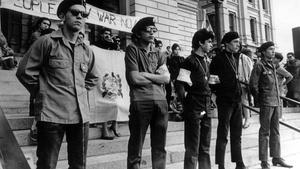 |
| Chicanos Visit The State Capitol - From Justicia y Libertad |
__________________________________________________________________________________
 |
| Photo of Lydia Mendoza at XEJ. Courtesy of the Arhoolie Foundation's Frontera Collection |
And speaking of American music: the Oxford American's annual music issue is on the stands and this year the focus is on the music of Texas. Not only does the magazine have some of the best writing and writers, but the CD that comes with this edition is loaded with absolutely terrific music. Everyone from Barbara Lynn (You'll Lose a Good Thing) to Big Brother and the Holding Company (Bye, Bye Baby.) The CD includes songs by Los Super 7 (Sunny Ozuna's iconic Talk to Me), Rosita y Laura (Esperando), Rick Treviño (El Gustito), the Texas Tornados (She Never Spoke Spanish to Me), and Freddy Fender (Paloma Querida). Ada Limón has a fine piece in the magazine entitled An American Sound, a tribute to Lydia Mendoza, La Alondra de la Frontera. Here's a sample from the article, which you can find in its entirety at this link:
But the music of the border is as much a part of the heritage of American folk music as Hank Williams, Robert Johnson, or the Carter Family, and the Tejano sound has existed and evolved for just as long, and dealt in similar themes. Mendoza's songs were saturated with stories about the darker side of human love, the hardships of working life, and the isolation experienced by the outsider. While her ballads of heartbreak voiced individual, though universal, laments, much of her music reflected a larger sense of loss -- that of an entire country -- with a relatable austerity.
Ada Limón is the author of three collections of poetry. Her fourth book, Bright Dead Things, is forthcoming from Milkweed Editions.
To end 2014 with some encouragement and get the right jump on 2015 with some reality, here are two paragraphs from Patrick Modiano's acceptance speech for the Nobel Prize in Literature 2014, which he delivered on December 7.
Writing is a strange and solitary activity. There are dispiriting times when you start working on the first few pages of a novel. Every day, you have the feeling you are on the wrong track. This
creates a strong urge to go back and follow a different path. It is important not to give in to this urge, but to keep going. It is a little like driving a car at night, in winter, on ice, with zero visibility. You have no choice, you cannot go into reverse, you must keep going forward while telling yourself that all will be well when the road becomes more stable and the fog lifts.
I have always thought that poets and novelists are able to impart mystery to individuals who are seemingly overwhelmed by day-to-day life, and to things which are ostensibly banal – and the reason they can do this is that they have observed them time and again with sustained attention, almost hypnotically. Under their gaze, everyday life ends up being enshrouded in mystery and taking on a kind of glow-in-the-dark quality which it did not have at first sight but which was hidden deep down. It is the role of the poet and the novelist, and also the painter, to reveal the mystery and the glow-in-the-dark quality which exist in the depths of every individual.
The Nobel Prize in Literature 2014 was awarded to Patrick Modiano "for the art of memory with which he has evoked the most ungraspable human destinies and uncovered the life-world of the occupation".
Happy New Year. Peace. Justice. Love.
Later.
Blog: La Bloga (Login to Add to MyJacketFlap)
JacketFlap tags: Chicano Christmas, Chicanonautica, Add a tag
Blog: La Bloga (Login to Add to MyJacketFlap)
JacketFlap tags: Jose Feliciano, Christmas, navidad, David Diaz, Feliz navidad, Add a tag
Blog: La Bloga (Login to Add to MyJacketFlap)
JacketFlap tags: book review, author readings, reading aloud, gluten free, chicano photography, Add a tag
Review: Martin Limón. The Iron Sickle. NY: Soho Press, 2014.
ISBN: 9781616953911
Guided serendipity led me to find a Martin Limón novel on the new books shelf of the library and in a flash I realized I hadn't seen a Sueño and Bascom novel in a while. Turns out I've missed two since enjoying 2009's G.I. Bones. Finding The Iron Sickle went ahead and made my day.
Martin Limón weaves all the elements together in The Iron Sickle, latest novel in the long-lived cop series. One needn’t have read other titles to enjoy everything The Iron Sickle offers, but Limón consistently alludes to events happening in earlier novels, head-turning, momentous stuff, dropped into a paragraph in passing. Limón gives a reader plenty of motivation to seek other titles in the series.
The Korea and Army setting will be completely foreign to all but a tiny fraction of U.S. readers. This makes the author responsible for a lot of explaining about language, culture, and attitudes, both Korean and Army. Limón uses that as a way to enrich the novels with fascinating local color and military slang.
George Sueño is the only Chicano in the novels, so his East LA background is noted only spottily in the series—he has no contemporaries at work, no one to talk to, so it doesn’t come up. Such is the life of being “the only one.” Plus, he’s a cop. But Limón isn’t glorifying cops shooting U.S. civilians. The cops in The Iron Sickle battle the Army as much as criminals.
In the novel, it’s been twenty years that events spun out of control on a remote mountainside during war, launching a murder spree for revenge and ruining lives. Sickled necks and a butchered rat lead the CID agents to a remote commo site in the middle of nowhere to discover a morally ambiguous criminality.
Bilingualism singles out the agent for going against the Army’s monolingual grain. In series novels, he speaks a little Spanish, but that’s not the issue. Sueño is the only CID agent in country who speaks and reads Hangul. Knowing the language inevitably leads to cracking the case while providing interesting insights into local language and culture. It’s also a signal that Sueño not only is a lifer, he’s addicted to Korea. Sueño’s so alienated from The World, as overseas GIs call the US, he’s never coming home.
Military culture puts obstacles in the investigation’s path. Hardheaded Officers and Senior NCOs follow the Army way which is uniformity and chain of command. Sueño and Bascom hold that in contempt and are the opposite of STRAC troopers expected of high headquarters minions.
Their results make them immune to all but spite, no matter how wild and impetuously the detectives act. Limón gives them lots of ways to act up; Bascom, a ville rat and short-fused jerk, Sueño, the oddball who thinks too much and hooks up with the wrong woman. When Sueño’s thinking too much he misses clues or gets his ass kicked.
When the boss or some general gets a case of the ass, the pair catch their ration of shit details, like arresting housewives for buying too many toothpastes. What really irks the chain of command is having the Koreans request Sueño and Bascom work a case.
Limón tirelessly exposes mindless military rivalry between US forces and local authority. These cops are righting wrongs despite established power, not to further the military’s goals. Solving crime often gives a well-deserved black eye to military politics. Higher ups prefer to keep matters quiet and tidy. Sueño and Bascom are loud and unruly, and that’s only half the fun of reading a Sueño and Bascom mystery.
The Iron Sickle treads on forbidden territory, cannibalism. While fiction can take readers into the most perverse territory, it won’t stop them from getting queasy at the horror of the crime, the imperative of revenge, and the unasked question, “how many wrongs make a right?”
The Iron Sickle is a great companion for a winter read. Curling up next to a fire and whiling away the hours until 2015 might be just the ticket for mystery readers with a hankering for off-the-wall travel writing.
 |
| Korean farmer at DMZ 1970. foto:msedano |
La Palabra Has Last Word
Gente crowd into the main gallery at Northeast Los Angeles' Avenue 50 Studio. Here for the final La Palabra reading of 2014, the prospect of hearing three of the city's most distinctive poetic voices draws them in well after the Open Mic is underway. Late-arrivers line up against the wall between the art or step gingerly into the space between the circled chairs to sit on the floor. SRO means "sitting room only" for Poet Laureate Luis J Rodriguez and friends Peter J Harris and Hector Flores.
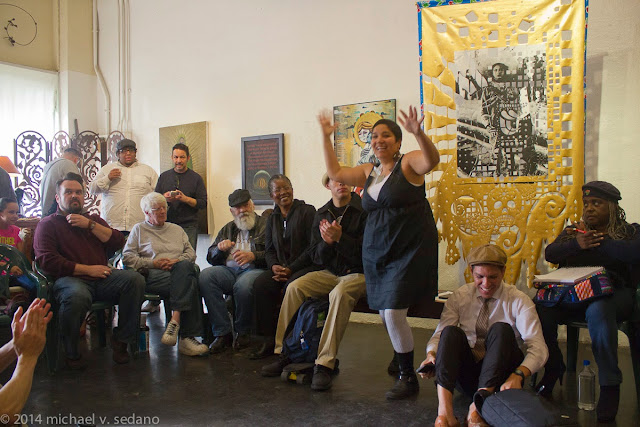 |
Karineh Mahdessian |
The first speaker doesn't read. He's a social scientist with a book and rambles for awkward minutes before audience members interrupt him with applause. He's reluctant to finish but the relieved Mahdessian steps in and the fellow fills his chair. The presentation offers one of the awful moments in an emcee's role, how to use the hook.
 |
| Rudy Calderón |
Calderón stands and projects with excellent resonance. There's so much energy in his body aching to break loose if allowed a stage. He controls it well and redirects much of that energy into the reading.
 |
| C.E. Jordan |
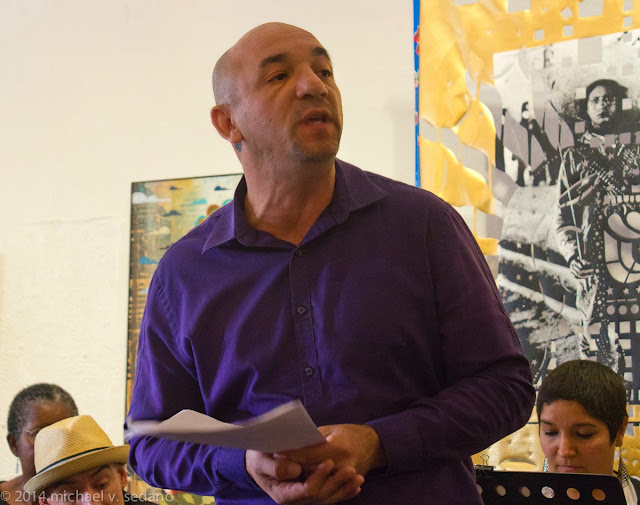 |
| Juan Carlos Valadez |
Mahdessian announces the next reader. From his chair, Valadez introduces his wife and daughter. He walks into the open space, and asks the teenager's permission to read a poem letter he wrote her from prison.
 |
| Rosalio Muñoz |
Muñoz is the final name signed to the Open Mic. A number of poets have asked for a slot so Mahdessian announces a second Open Mic after the three featured readers.
The featured poets have conferred and adapted to the setting and audience. Rather than do three stand-ups, Hector Flores, Peter J. Harris, and Luis J. Rodriguez will do a round-robin. Harris goes first.
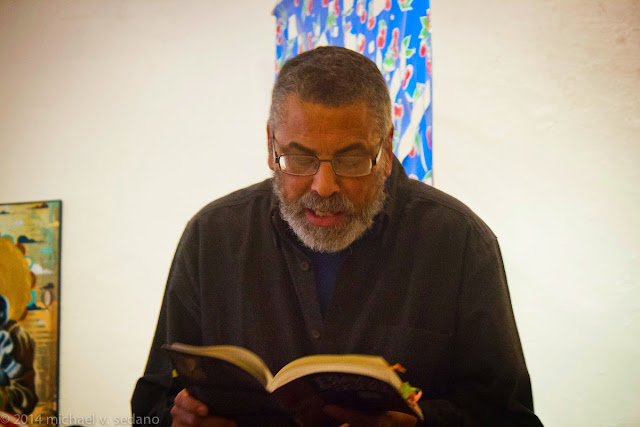 |
| Peter J. Harris |
 |
Peter J. Harris |
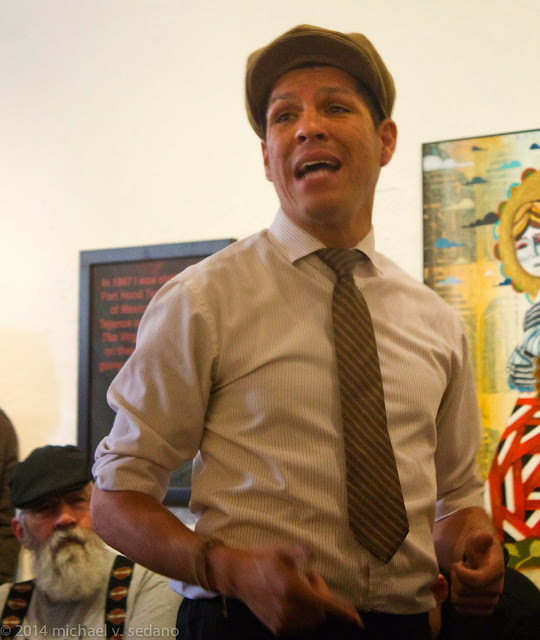 |
| Hector Flores |
 |
| Hector Flores |
It's not that Luis forgot his stuff back at the house and will read old stuff. Rodriguez' good stuff is timeless and he keeps working on them, if not in the craft in the performance.
Rodriguez has rarely read these poems with the kind of sustained energy he displays in the packed space today.
He's loud, he's angry, he's emotional, ya se cansó. Thoughts and emotions in words come out in his arms, eyes, brow, posture. He fills the space allowed. He reads today focused on content over form, breaking at thoughts instead of lines.
Media aren't the Laureate's friend today. One poem comes from an orange quarter-fold booklet, another from a telephone screen, two from a book. He needs his anteojos, plus he's getting off the floor every third reader.
Rodriguez, like Harris, works to personalize the reading through eye contact. Reliant upon their text, it's sparse and momentary. Their work has enough power that audiences don't miss what they're not getting. But because these poets could do these poems from memory without the prop, there's a lost opportunity to magnify their audience's enjoyment of the work.
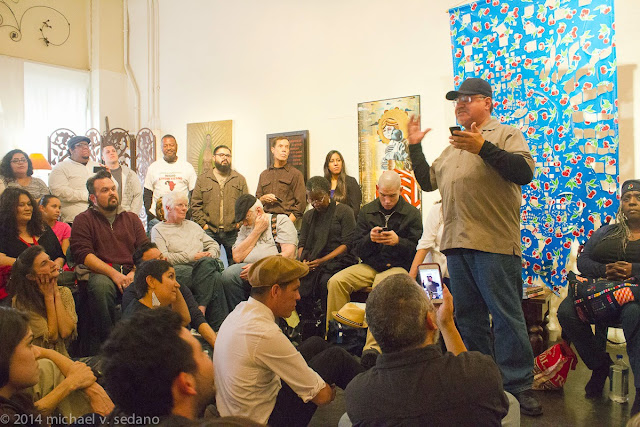 |
| Luis J. Rodriguez |
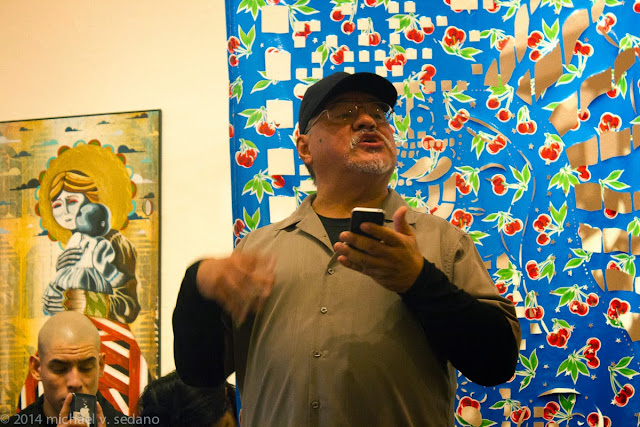 |
| Luis J. Rodriguez |
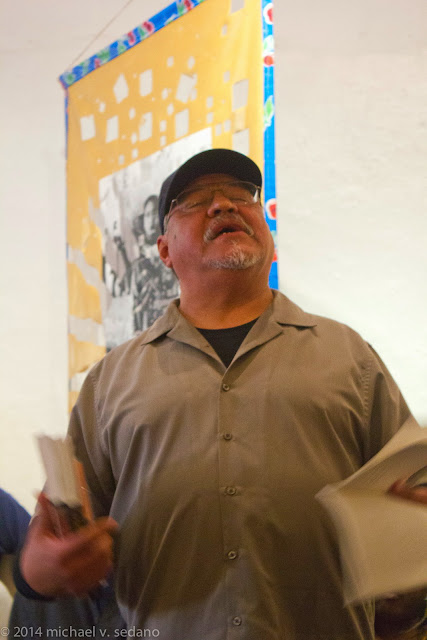 |
| Luis J. Rodriguez |
The Gluten-free Chicano
Good Mexican Girl Hits the Spot
Earlier in December, The Gluten-free Chicano sat around feeling sorry for himself that gluten-free analogs are crummy and he needed a snack. The Gluten-free Chicano, in a fit of antoja, wrote about a gluten-free bakery that sounded like it would hit the spot, the Good Mexican Girl's cookies.
The Good Mexican Girl herself took the column as a challenge, to get some of her cookies to The Gluten-free Chicano. She did it. And he's glad.
GMG gluten-free Mexican Wedding Cookies aren't quite the powdery puro butter and wheat flour nuggets of yesteryear, but GMG Mexican Wedding Cookies are number hana, as they say in Korea, number one.
They hit the spot.
GMG discovered the secret to a velvety texture on the tongue. Other GF treats have a raspy grit to them like 440 sandpaper on the tongue. Yuck. Bite into the crumbly texture of a GMG Mexican Wedding Cookie and all the flavor and a pleasing tooth greet one. Savor it and allow the crumbs to work their magic. Smooth all the way down. Next: GMG chocolate chip cookies.
¡Ajua! Good Mexican Girl. Te aventastes.
Late-breaking News!
https://www.facebook.com/events/484993604975550/
Click link to get your tickets.
Floricanto for Michele Serros
Sunday, January 4, 2015at 6:00pm
Alumni House, UC Berkeley
1 Alumni House, Berkeley, California 94720
La Bloga encourages readers to purchase tickets to support Michele Serros' challenges during her health crisis. Gente in the Bay area will want to appear in-person for this important event. Here is the latest organizer report.
Hosts/MCs:
Joseph Rios- friend of Michele and poet
Jennie Luna- friend and Cal State Professor of Xican@ studies at Cal State Channel Islands
Readers/Friends of Michele:
Melinda Palacio- author and friend
Joe Loya- author and friend
Cindy Cruz- close friend of Michele and professor of education at UCSC
Alberto Ledesma- friend, UC Berkeley professor and DREAM artivista
Silent Auction at the event with works by:
Malaquias Montoya
Maceo Montoya
Melanie Cervantes
Mitsy Avila Ovalles
Santos Shelton
Lalo Alcaraz
Ester Hernandez
Jessica Sabogal
Signed vinyl records from the band, Chicano Batman
Blog: La Bloga (Login to Add to MyJacketFlap)
JacketFlap tags: Add a tag
Blog: La Bloga (Login to Add to MyJacketFlap)
JacketFlap tags: Add a tag
Dear Gente,
Blog: La Bloga (Login to Add to MyJacketFlap)
JacketFlap tags: memories, navidad, Chicano Christmas, Reyna Grande, gingerbread house, Jose Mercado, albondigas, iguala guererro, memorias de navidad, mexican santa, Add a tag
 |
| Not mine, but maybe... |
Her chemistry and electricity passed into the ether long before I was old enough to gift her anything of value, and I only wish I'd spent more time chatting at length with her, like I did towards the end, hers, not mine. I still think it's one of the cutest things--an old person asking about "mis Kreesmas," a heavy Spanish-laden accent that goes back even further in history to the time before the Olmecs. Before there was a Xmas.
 * Tamales. Every Chicano family always makes tamales for the holiday, right? (Actually, not if they're cheap enough to buy, which they no longer are in Denver.) Over the years, our families had also cooked other things. Argentinian empanadas, fried or baked, buffalo burger or of cualquier cosa. Or albóndigas soup or tons of burritos, on occasion. The type of food didn't matter. It was the communal, tribal means of production that made the cooking enjoyable.
* Tamales. Every Chicano family always makes tamales for the holiday, right? (Actually, not if they're cheap enough to buy, which they no longer are in Denver.) Over the years, our families had also cooked other things. Argentinian empanadas, fried or baked, buffalo burger or of cualquier cosa. Or albóndigas soup or tons of burritos, on occasion. The type of food didn't matter. It was the communal, tribal means of production that made the cooking enjoyable. |
| Not one of mine. |
 * Possibly my best Krismas teaching was a first-grade class that got a visit from Greg Allen-Pickett, a teacher-friend who'd guided my wife and I through Yucatan a previous Krismas. My class of mostly immigrant students knew Santa would visit the room because I'd arranged it with Greg who had his own outfit. When this near-seven-foot man of broad shoulders and build entered the room, in costume, the kids were delighted. When they tugged on his huge white beard, they were surprised to learn it was real! But, when he spoke Spanish to them better even than their regular teacher, they were astounded. Greg left the state, and I left teaching. However, I doubt the memory of the most realistic, bilingual Santa ever left them.
* Possibly my best Krismas teaching was a first-grade class that got a visit from Greg Allen-Pickett, a teacher-friend who'd guided my wife and I through Yucatan a previous Krismas. My class of mostly immigrant students knew Santa would visit the room because I'd arranged it with Greg who had his own outfit. When this near-seven-foot man of broad shoulders and build entered the room, in costume, the kids were delighted. When they tugged on his huge white beard, they were surprised to learn it was real! But, when he spoke Spanish to them better even than their regular teacher, they were astounded. Greg left the state, and I left teaching. However, I doubt the memory of the most realistic, bilingual Santa ever left them. |
| Definitely not gentry |
 * Most of you know that author Reyna Grande is spending the holidays in Iguala, Guerrero, where the 43 students were disappeared. It was her hometown that she trekked north from, as described in her books. She recently raised more than $5k for toys and food to present to the people of the village she left decades ago. It's like she's playing Santa, among some of the poorest people in the world, with some of the most minimal facilities, and walking around every corner wondering who might lurk to disappear you. Hopefully, she'll provide La Bloga with an extended report after she returns. I imagine that the only thing better than reading it will have been accompanying her. I'm sure that waiting list is longer than Santa's.
* Most of you know that author Reyna Grande is spending the holidays in Iguala, Guerrero, where the 43 students were disappeared. It was her hometown that she trekked north from, as described in her books. She recently raised more than $5k for toys and food to present to the people of the village she left decades ago. It's like she's playing Santa, among some of the poorest people in the world, with some of the most minimal facilities, and walking around every corner wondering who might lurk to disappear you. Hopefully, she'll provide La Bloga with an extended report after she returns. I imagine that the only thing better than reading it will have been accompanying her. I'm sure that waiting list is longer than Santa's. * I'm completing work with dramatist Jose Mercado, on my first stage play, Los Doce Días de Mis Krismas. (I needed help since my two CU-Denver college classes mostly taught me professors were superior to any student's work or thoughts.) Some of you have read the story on La Bloga, as a radio script, but Mercado formatted it for a play and says it's funny now. I thought it was before. After it's officially copyrighted, I'll get it out in the world, however that's done. And maybe you'll get to see it one Krismas. It's even funnier than Jose thinks.
* I'm completing work with dramatist Jose Mercado, on my first stage play, Los Doce Días de Mis Krismas. (I needed help since my two CU-Denver college classes mostly taught me professors were superior to any student's work or thoughts.) Some of you have read the story on La Bloga, as a radio script, but Mercado formatted it for a play and says it's funny now. I thought it was before. After it's officially copyrighted, I'll get it out in the world, however that's done. And maybe you'll get to see it one Krismas. It's even funnier than Jose thinks. * Whenever I go to Mexico or even a poor neighborhood in the U.S., I inevitably see little kids playing with a lot less than electric Hummers they can ride or remote drones they can spy with. Instead, I've seen little girls in raggedy clothes stirring the ground with a twig, making designs, drawing scenes or imagining future paths. Or a couple of boys sorting rocks of different sizes, maybe preparing their teams or armies for a slaughter. Kids don't need stuff; they need opportunity for their imaginations, time to explore and discover the world's wonders.
* Whenever I go to Mexico or even a poor neighborhood in the U.S., I inevitably see little kids playing with a lot less than electric Hummers they can ride or remote drones they can spy with. Instead, I've seen little girls in raggedy clothes stirring the ground with a twig, making designs, drawing scenes or imagining future paths. Or a couple of boys sorting rocks of different sizes, maybe preparing their teams or armies for a slaughter. Kids don't need stuff; they need opportunity for their imaginations, time to explore and discover the world's wonders.[I'll give you a hint: it wasn't a shining star.]
Blog: La Bloga (Login to Add to MyJacketFlap)
JacketFlap tags: luis j. rodriguez, Tia Chucha's, Reyna Grande, Michele Serros, Dialogos Books, Jose Torres-Tama, winterlandía, Add a tag
Melinda Palacio
 |
| Saturday, December 20, Winterlandia's Anti-Mall Marketplace |
| At the Latino Book and Author Festival in 2010, Luis Rodriguez, Michele Serros, Melinda Palacio and Daniel Olivas |
| One of over 300 children in Iguala who will benefit from Reyna Grande's Posada. |
Blog: La Bloga (Login to Add to MyJacketFlap)
JacketFlap tags: Add a tag
-->
Blog: La Bloga (Login to Add to MyJacketFlap)
JacketFlap tags: El Salvador, Rene Colato Lainez, talleres de poesia, children's books, Add a tag
Blog: La Bloga (Login to Add to MyJacketFlap)
JacketFlap tags: oral performance, chicano photography, Add a tag
Michael Sedano
Everyone has a story and everyone’s story deserves telling. Alex Luu conducts workshops with young adults that guide their planning, structuring, and telling their stories to an audience in an evening of theatrical expression.
Stories emerge raw and in the vernacular the students live daily. It's a no-holds-barred world and the writers let loose.
A girl stands in the dark, glamour images projected behind her show a pretty, fit beauty. She screams words she hears when she dresses like the pictures, “Whore!” “Can it be any lower?”
Another girl projects birthday portraits remembering each year’s gifts and parties. Absent always was her one perfect gift, the presence of her father. Other children’s autobiographies express the same single-parented pain.
One boy wants to be a musician but hears his mother’s angry voice that he’s wasting his. Another boy listen to his soccer ball's consejos and taunts in a funny, imaginative piece.
A lot students speak of abandonment, loneliness, powerlessness, helplessness, and others of their dreams, plans, visions of a happier future.
Teenagers have the worst and best of two worlds, childhood and adulthood. The impacts of their parenting simmer and accumulate until the children reach their teens and young adulthood. Now the consequences of those experiences, and their influence upon decisions, will reverberate far into their adult future. It’s the divergence of two roads and there’s no going back.
There is in creative non-fiction. Luu coaches his performers to fantasize. Several presentations engage scenes where the kid;s persona works up the gumption to tell off an overbearing adult. Spirits soaring, the speaker turns to the audience and admits “I didn’t really say that but I wish I had.” And presto, they have. It’s a South El Monte story and this is why you tell them.
Bringing mostly bad experiences, and how the person feels about them, to life can bring a person to a skidding halt, a good thing if matters are running on intertia, or have taken a bumpy path.
Writing about a situation becomes a way of handling and making sense of one's daily storms. For numerous exigencies, expression offers the sole means of gaining control over a problem.
After the performance--they ran three nights--the standing room only audience keeps their seats for a Q&A. Most questions wonder how the students worked up the confidence to share such intimacy with strangers, publicly. A couple answer they started out withdrawn but opened up and forged community with their workshop peers. Being of the group loosened them up in private and it was easy progression to public expression.
A questioner says she's with drama students from another high school. These students have learned from South El Monte and leave encouraged to tell their own stories. The South El Monte Storytellers brim enchanted that their voice has found listeners outside the confines of their South El Monte universe. This is, after all, why one speaks.
Alex Luu
Audience packs the house
Yesenia Velasquez
Anamaria Flores
Anthony Morales
Audrey Youshimatz
Isaac Caudillo
Steven Reyes
Jenna Flores
Linda Catano
Rosario Morales
Taking a Bow
Blog: La Bloga (Login to Add to MyJacketFlap)
JacketFlap tags: FIL, Feria Internacional del Libro, Lawrence Schimel, Luis Armenta Malpica, Mantis Editores, Add a tag
 |
| Luis Armenta Malpica |
 |
| Light’s Volition/Voluntad de la luz by Luis Armenta Malpica, translated by Lawrence Schimel (Mantis Editores, 2012) |
View Next 25 Posts



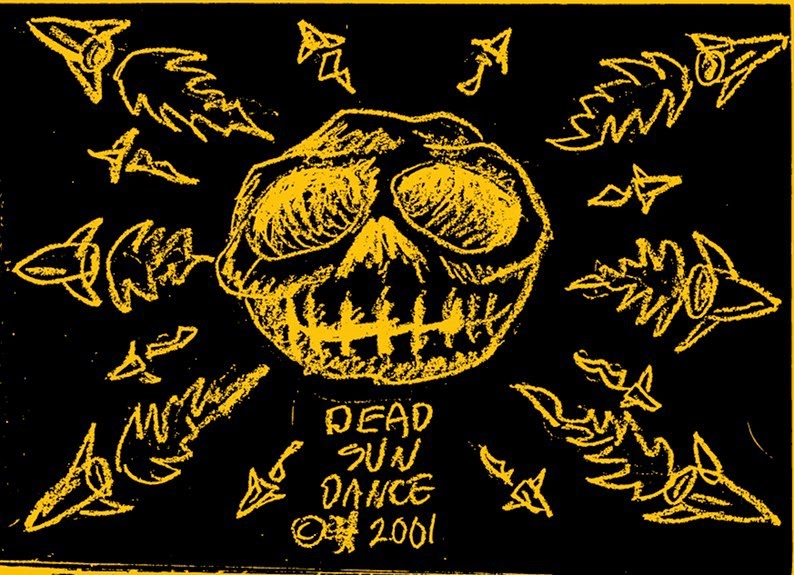



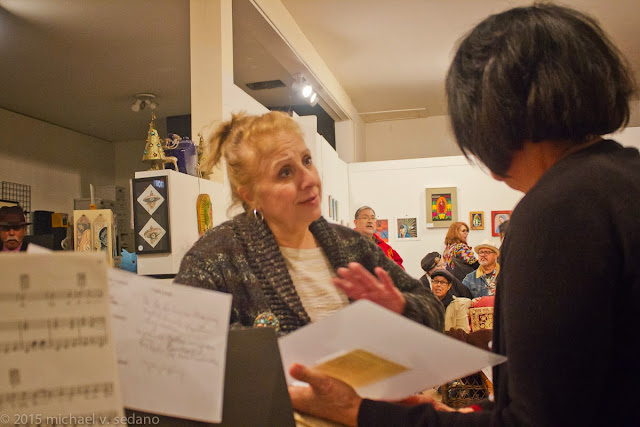

































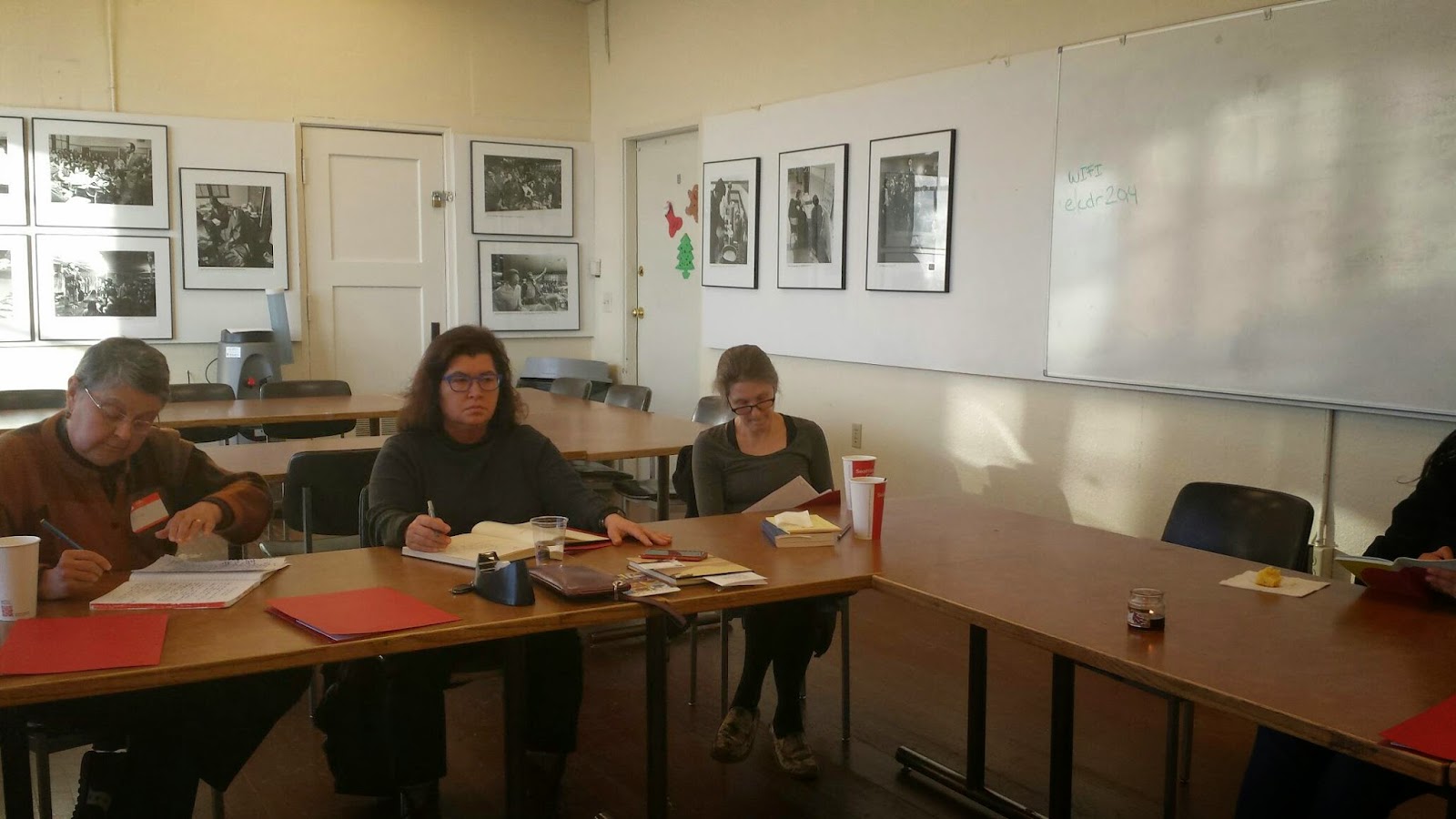











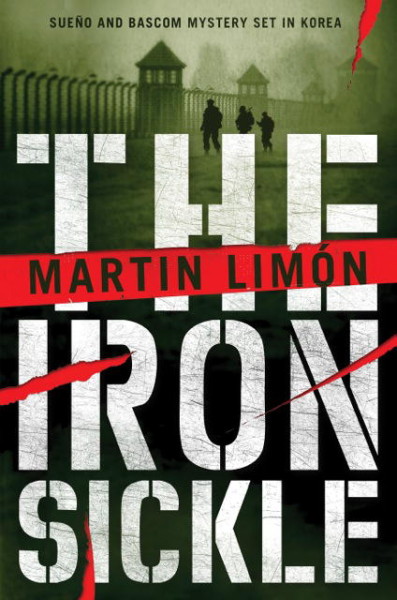




%2B(1).jpg)





























